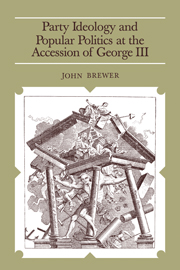Book contents
- Frontmatter
- Contents
- Preface
- A note to the reader
- PART I INTRODUCTION
- PART II THE RECONFIGURATION OF POLITICS
- 3 Whig and tory
- 4 Opposition and the proprietary parties
- 5 From Old Corps to Rockinghamite whigs: the emergence of a party
- 6 Pitt and patriotism: a case study in political argument
- 7 Ministerial responsibility and the powers of the Crown
- PART III AN ALTERNATIVE STRUCTURE OF POLITICS
- PART IV FOCUSSED RADICALISM
- PART V TWO POLITICAL NATIONS
- PART VI CONCLUSION
- Notes
- Bibliography
- Index
4 - Opposition and the proprietary parties
Published online by Cambridge University Press: 15 December 2009
- Frontmatter
- Contents
- Preface
- A note to the reader
- PART I INTRODUCTION
- PART II THE RECONFIGURATION OF POLITICS
- 3 Whig and tory
- 4 Opposition and the proprietary parties
- 5 From Old Corps to Rockinghamite whigs: the emergence of a party
- 6 Pitt and patriotism: a case study in political argument
- 7 Ministerial responsibility and the powers of the Crown
- PART III AN ALTERNATIVE STRUCTURE OF POLITICS
- PART IV FOCUSSED RADICALISM
- PART V TWO POLITICAL NATIONS
- PART VI CONCLUSION
- Notes
- Bibliography
- Index
Summary
They [opposition] leave no means unattempted to draw your m - - - - - -'s faithful subjects into factions and cabals, and to engage them in schemes prejudicial to the public good; they endeavour to clog the wheels of government; they would rather see their country in ruins, than in other hands beside their own faction.
(To the K - - g. Belisarius, London Evening Post, 17 February 1770)Opposition, in parliament, to the measures of government, is so far from being in itself an evil, that it has been often productive of good to the state. It may arise from principles that are highly commendable; and even when the motive has been thought indefensible, prudent and well-timed opposition has frequently been of benefit to the community, as well as to the party. The fault lies not in the thing itself, but in the perversion of it to a sinistrous [sic] purpose; for as there can be no ministry without errors, it is highly expedient, that there should be some political Argus's, who, either from principle, or selfish views, may watch over the conduct of the servants of the Crown, and check their encroachments upon the civil rights of the people.
(Creon, Gazetteer, 30 January 1770)Perhaps the greatest problem that confronted those who formed an opposition or proprietary party was the overwhelming hostility of those who prided themselves on their personal independence and integrity, or upon their paramount allegiance to the Crown.
- Type
- Chapter
- Information
- Publisher: Cambridge University PressPrint publication year: 1976



